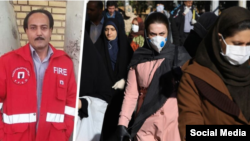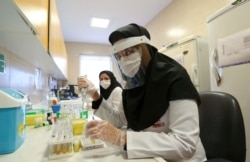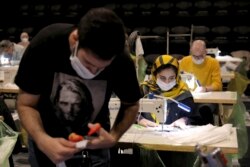In a rare interview with a U.S. news organization, an Iranian opposition activist who has been arrested multiple times in recent years said government mismanagement of the coronavirus pandemic has worsened economic hardships for low-income workers.
Zartosht Ahmadi Ragheb shared his view of Iran’s pandemic response in a Tuesday phone conversation with VOA Persian from his home in the Tehran suburb of Shahriar.
It was a rare on-the-record interview with a U.S. news outlet by an Iran-based dissident at a time when Iranian authorities have been detaining other activists and journalists for posting online criticisms of alleged government mismanagement and misinformation related to the pandemic.
Iran views VOA, its sister network Radio Farda and other Western news agencies that produce content in Persian as hostile entities for their coverage of accusations of Iranian government mismanagement of the Islamic republic’s domestic and foreign crises.
“Even before the virus struck, the Iranian economy already had collapsed, and now that people have been told to stay home, it has gotten worse,” Ahmadi Ragheb told VOA. “But in these horrible times, working-class people and the destitute have had to leave their homes and defy quarantine rules, since they are the breadwinners of their families.”
Iran’s economy fell into recession in 2018 as its long-running problems with government mismanagement and corruption were compounded by the U.S. toughening unilateral sanctions aimed at pressuring Tehran to end perceived malign behaviors.
An International Monetary Fund report released Tuesday said Iran saw its recession deepen in 2019, with GDP shrinking 7.6 percent after a 5.4 percent contraction the year before. The IMF also projected that Iran would see a third consecutive year of recession in 2020 with GDP contracting a further 6 percent.
Iran announced its first coronavirus cases and deaths on February 19. Western news media have published accusations that Iranian authorities knew the virus was spreading and killing Iranians weeks earlier than that date. They also have reported allegations that after initially hiding the outbreak, officials have significantly underreported the number of cases and deaths.
In an April 11 commentary published by semi-official news agency ISNA, Iranian government spokesman Ali Rabiei acknowledged that 7 million Iranians either have lost their jobs or have seen their employment temporarily suspended because of the pandemic. He also referred to a recent poll in which about 35 percent of Iranian respondents said they were unable to make ends meet because of increasing economic hardships.
Iran shut down nonessential parts of its economy, urged people to stay home and banned intercity travel last month to try to curb the coronavirus outbreak, the largest and deadliest in the Middle East.
But in an April 5 announcement, President Hassan Rouhani said he would allow “low-risk” businesses to resume operations on April 11 in most of the country and in Tehran on April 18.
Iranian Health Minister Saeed Namaki later acknowledged that if people become complacent and disregard government pleas to keep observing social distancing and other health practices, Iran “surely” will face a second wave of the virus.
“In light of these cases of Iranian regime mismanagement, undoubtedly the Iranian people face ongoing unemployment and recession. And we should be ready for new uprisings,” Ahmadi Ragheb said.
Iran has seen several waves of nationwide anti-government protests in recent years, with the deadliest happening in November in response to authorities raising subsidized gas prices. Iranian security forces crushed the protests, killing at least 1,500 people, according to U.S. officials. Iran has called that figure exaggerated without disclosing its own death toll.
Ahmadi Ragheb’s most recent arrest was last August, after he joined 13 other male dissidents in writing a June 2019 letter calling on Iranian Supreme Leader Ayatollah Ali Khamenei to step down. Detained in Tehran’s Evin prison and accused of sedition, the activist staged several hunger strikes against what he called violations of his rights before authorities released him on bail on January 11.
Ahmadi Ragheb’s activism previously led to his dismissal from a 17-year career as a Tehran firefighter.
This article originated in VOA’s Persian Service.






